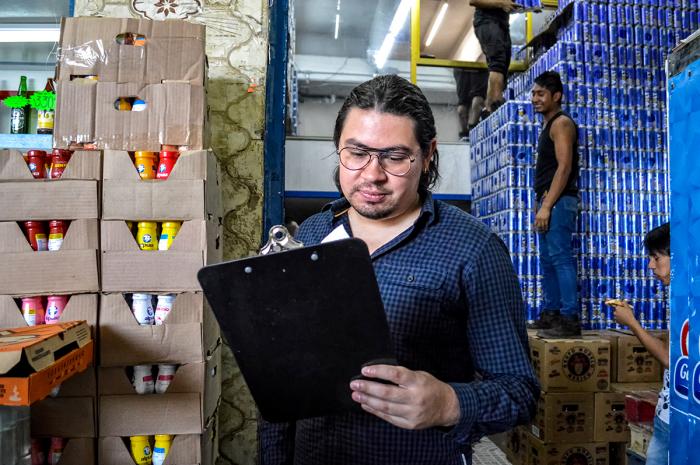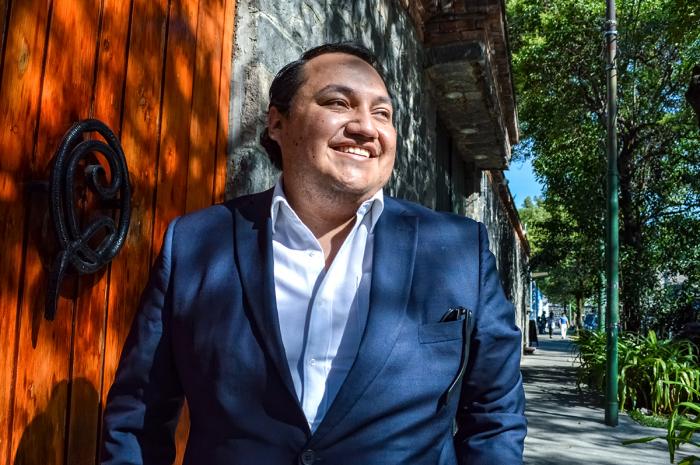We ask you, urgently: don't scroll past this
Dear readers, Catholic Online was de-platformed by Shopify for our pro-life beliefs. They shut down our Catholic Online, Catholic Online School, Prayer Candles, and Catholic Online Learning Resources essential faith tools serving over 1.4 million students and millions of families worldwide. Our founders, now in their 70's, just gave their entire life savings to protect this mission. But fewer than 2% of readers donate. If everyone gave just $5, the cost of a coffee, we could rebuild stronger and keep Catholic education free for all. Stand with us in faith. Thank you.Help Now >
Mexico's Youth Adapt to Meet Demands of Job Market
FREE Catholic Classes
Just below a glass-domed ceiling that fills the room with sunlight, an aerial dancer suspends herself from black strips of fabric more than seven meters (23 feet) above the ground.

Highlights
Catholic Online (https://www.catholic.org)
7/16/2018 (7 years ago)
Published in Living Faith
Keywords: Mexico's Youth, Adapt to Meet, Demands of Job Market
MEXICO CITY, MEXICO -" With resin on her hands and fishnet stockings on her legs, Guadalupe Lopez Jimenez, 32, is ready to begin her aerial-dance routine. She performs and teaches throughout the week at schools, sports clubs and cultural centers, as well as at events.
She absolutely loves her job.
"I think I leave a mark in the hearts of all the people who come to see me," she says. "It's the most satisfying thing that has happened to me. I wouldn't change it for anything."But Lopez Jimenez didn't study this profession back in her school days.
"I would have liked to study dance professionally," Lopez Jimenez says. Instead, she studied architectural engineering, a subject she liked but that her parents encouraged her to pursue. Finding work, she says, wasn't difficult, but she was unfulfilled.
"Although architecture can leave a mark, the mark I leave with dance is more intimate," she says.

Guadalupe Lopez Jimenez, 32, didnâ⬠t have a problem finding a job in architectural engineering when she graduated, but she pursued her passion for the arts and dance instead, even though itâ⬠s not the subject she studied.
Lopez Jimenez is one of many young people in Mexico who studied a subject that doesn't directly correlate to their current work. In 2015, the Universidad Nacional Autonoma de Mexico (UNAM), a university in Mexico City, surveyed 15,895 graduates on how they classified the relationship between their studies and their job.
According to the survey, 60.72 percent said their studies and their job were highly related. The remaining respondents either didn't work or didn't respond (1.69 percent); or classified their studies and job as unrelated (5.08 percent); marginally related (6.52 percent) or somewhat related (25.98 percent).
For some young people in Mexico, jobs that are highly related to their studies just aren't there.
Aurora Loyo Brambila, a researcher at the Instituto de Investigaciones Sociales de la Universidad Nacional Autonoma de Mexico, an institute for social research at UNAM, says that many fields of study in Mexico offer limited opportunities after graduation. Or, available jobs are low-paying, temporary contracts with no health benefits.

Daniel Alberto Paniagua Flores, 29, who studied audiovisual communication, manages the finances of his familyâ⬠s grocery store in Mexico City, Mexico. He says he had trouble finding work related to his major because of his expectations for pay and time commitment.
"There is no comprehensive planning to match majors with jobs. Eliminating the individual capacity of each person to choose what they want to study would almost be a dictatorship," Loyo Brambila says.
Some young people are interested in sectors that, in Mexico, simply aren't in demand for employment. Mexico City's governing body for youth policy, the Instituto de la Juventud de la Ciudad de Mexico, runs a program called "Mi Primer Trabajo," which means "my first job." The program helps young people ages 18 to 29 from Mexico City find jobs.
Since 2014, when the program started, 17,319 people have participated. According to the institute, young people request jobs most frequently in accounting, administration and graphic design; those sectors offer many jobs. But other fields in which young people want to work, such as journalism and psychology, do not. Young people have to find other options.
Daniel Alberto Paniagua Flores, 29, manages the finances of his family's grocery business. He graduated with a degree in audiovisual communication. He says he knew it would be difficult to find a job in that field, but it's the work he wanted to do.
"It was temporary, but I'm still here," Paniagua Flores says of his current job. "I looked for work [related to my major], but not all of them met my economic and time expectations."
Some of the jobs available to graduates in certain fields just don't pay well. Finance ranks fifth on a list of highest-paid careers in Mexico, based on average salary, published by the Instituto Mexicano para la Competitividad (IMCO), a think tank that examines economic and social issues. Audiovisual communication ranks 44th.

Jorge Alberto MartÃÂnez Fabila, 30, studied law and currently works at a law firm in Mexico City, Mexico. His parents are lawyers. Martinez Fabila says itâ⬠s important for young people to investigate which careers are in high demand before choosing a major.
Jose Olivera, 29, graduated with a degree in art, which is 40th on the list of highest-paid careers. He participated in various art projects after graduating, but he couldn't find any formal employment.
"I was overqualified or underqualified [for jobs], and that was the first big blow I experienced," Olivera says.
Because of economic necessity, Olivera says he took the first opportunity he found, working in an accounting office. He's made the best of it.
"It is difficult because you always grow up with the idea that you are going to dedicate the rest of your life to what you studied, but now it's a really good opportunity. It keeps me afloat," Olivera says.
In Mexico, Loyo Brambila says, several factors contribute to a young person's ability to land a job, whether or not their work is related to their studies.
Young people with access to a better education, who are bilingual or multilingual, and who are well-connected do the best when it comes to job searching, Loyo Brambila explains.
Jorge Alberto MartĂÂnez Fabila, 30, is the child of two lawyers. He studied law, which ranks 26th on IMCO's list of best-paid careers.
"[Finding] work wasn't hard for me because, halfway through the major, I began to work in an office, and, when I finished the major, I got a formal job at a notary," MartĂÂnez Fabila says. Now, he works at a law firm, and says he's very satisfied with his job.
"In my current job, I see new things and issues that, if I weren't here, I would never be able to learn about," MartĂÂnez Fabila says. "I love my career, and I wouldn't change it for anything."
Paniagua Flores and Olivera say that if they could go back, they might have picked different courses of study.
Olivera says he learned so much about culture while studying art, and he could have enhanced his knowledge by also studying architecture, design or even publicity.
In his current work managing the books for the family business, Paniagua Flores considers how he could improve his professional skills.
"Now I think that I would have liked to study something related to administration in order to better develop myself in my current job," he says.
Rishi Khalsa, GPJ, translated this article from Spanish.+
Mar Garcia, Reporter | Mikala Jamison, | Rishi Khalsa, | Terry Aguayo, | Allison Braden, | Austin Bachand
A version of this story originally appeared on Global Press Journal.
Support FREE Catholic Education
---
'Help Give every Student and Teacher FREE resources for a world-class Moral Catholic Education'
Copyright 2021 - Distributed by Catholic Online
Join the Movement
When you sign up below, you don't just join an email list - you're joining an entire movement for Free world class Catholic education.
A Lenten Message from Sister Catherine - Please Watch
- Easter / Lent
- 5 Lenten Prayers
- Ash Wednesday
- 7 Morning Prayers
- Mysteries of the Rosary
- Litany of the Bl. Virgin Mary
- Popular Saints
- Popular Prayers
- Female Saints
- Saint Feast Days by Month
- Stations of the Cross
- St. Francis of Assisi
- St. Michael the Archangel
- The Apostles' Creed
- Unfailing Prayer to St. Anthony
- Pray the Rosary
![]()
Copyright 2026 Catholic Online. All materials contained on this site, whether written, audible or visual are the exclusive property of Catholic Online and are protected under U.S. and International copyright laws, © Copyright 2026 Catholic Online. Any unauthorized use, without prior written consent of Catholic Online is strictly forbidden and prohibited.
Catholic Online is a Project of Your Catholic Voice Foundation, a Not-for-Profit Corporation. Your Catholic Voice Foundation has been granted a recognition of tax exemption under Section 501(c)(3) of the Internal Revenue Code. Federal Tax Identification Number: 81-0596847. Your gift is tax-deductible as allowed by law.









